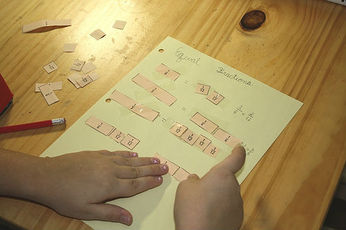Math Problems: Often Overlooked, Always Challenging

Despite the fact that math disorders are at least as common as reading problems, to date, reading has received the lion’s share of attention among educators, clinicians, policy makers, and researchers. When we look beyond students with specific math disabilities, countless other children are confounded by math. Anyone who has been called on to help their child with math homework is well aware of how stressful it can be. Believe me, I know, having just spent the better part of an evening helping our son prepare for an important math test. In fact, “Math Anxiety” is actually a recognized diagnosis. Just looking at a page of numbers is enough to make many children shut down. And let’s not forget the disturbing fact that girls in our country lag behind boys in their acquisition of math skills.
There are hopeful signs that things are about to change. This past September, the International Mind, Brain, and Education Society (IMBES) devoted an entire issue of their journal to the topic of math. Together with the Learning and the Brain Foundation, IMBES selected Dr. Daniel Ansari for this year’s award for Transforming Education through Neuroscience for discovering the brain networks for mathematics. Those of us who had the opportunity to attend the recent Learning and the Brain conference in Boston, MA were treated to several talks by Dr. Ansari, as well as other researchers who are rapidly elucidating the mechanism for the acquisition of math competence. Those of you interested in learning more about Dr. Ansari’s work should review the website for the Numerical Cognition Laboratory, which he directs at the University of Western Ontario.
For those of us who are committed to helping every child experience academic success, this work is long overdue. Unfortunately, traditional psycho-educational and neuropsychological testing has not been particularly helpful in identifying and addressing these all too common math struggles. However, based on the emerging research, we are learning more and more about math each day. For example, we now know that acquisition of “numeracy” and “automaticity” are critical milestones in the development of math competence. While many animals can detect quantities, only humans link them to symbolic representations, numerals. Linking numerals to corresponding quantities (numeracy) is the mathematical equivalent of connecting letters to sounds for reading (phonics). Next, becoming automatic with two digit calculations (automaticity) is necessary for math proficiency.
At The Yellin Center, we have incorporated new research-based diagnostic tools into our evaluation process to examine these critical functions and to expand our repertoire of math strategies to share with children, parents, and educators. As researchers continue to expand our understanding of how learning happens, it is the role of clinicians to translate these findings into practical ways to understand and support students. It is an exciting time in math education, and we are pleased to be a part of making mathematics accessible to more students.
-Paul B. Yellin, MD, FAAP
Paul B. Yellin, MD, FAAP, is director of The Yellin Center for Mind, Brain, and Education and an Associate Professor of Pediatrics at New York University School of Medicine, Department of Pediatrics.
Photo: CC by jimmiehomeschoolmom
There are hopeful signs that things are about to change. This past September, the International Mind, Brain, and Education Society (IMBES) devoted an entire issue of their journal to the topic of math. Together with the Learning and the Brain Foundation, IMBES selected Dr. Daniel Ansari for this year’s award for Transforming Education through Neuroscience for discovering the brain networks for mathematics. Those of us who had the opportunity to attend the recent Learning and the Brain conference in Boston, MA were treated to several talks by Dr. Ansari, as well as other researchers who are rapidly elucidating the mechanism for the acquisition of math competence. Those of you interested in learning more about Dr. Ansari’s work should review the website for the Numerical Cognition Laboratory, which he directs at the University of Western Ontario.
For those of us who are committed to helping every child experience academic success, this work is long overdue. Unfortunately, traditional psycho-educational and neuropsychological testing has not been particularly helpful in identifying and addressing these all too common math struggles. However, based on the emerging research, we are learning more and more about math each day. For example, we now know that acquisition of “numeracy” and “automaticity” are critical milestones in the development of math competence. While many animals can detect quantities, only humans link them to symbolic representations, numerals. Linking numerals to corresponding quantities (numeracy) is the mathematical equivalent of connecting letters to sounds for reading (phonics). Next, becoming automatic with two digit calculations (automaticity) is necessary for math proficiency.
At The Yellin Center, we have incorporated new research-based diagnostic tools into our evaluation process to examine these critical functions and to expand our repertoire of math strategies to share with children, parents, and educators. As researchers continue to expand our understanding of how learning happens, it is the role of clinicians to translate these findings into practical ways to understand and support students. It is an exciting time in math education, and we are pleased to be a part of making mathematics accessible to more students.
-Paul B. Yellin, MD, FAAP
Paul B. Yellin, MD, FAAP, is director of The Yellin Center for Mind, Brain, and Education and an Associate Professor of Pediatrics at New York University School of Medicine, Department of Pediatrics.
Photo: CC by jimmiehomeschoolmom
